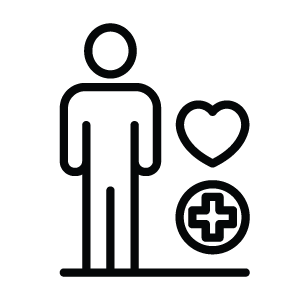Colon Cancer Fit Test
Among cancers that affect both men and women, colon cancer is the second leading cancer killer in the United States. The disease is treatable and can easily be prevented if screened early.
Colon Cancer
If the cancer is detected and treated in the earliest stages, between 80 and 90 percent of patients are restored to normal health. Additionally, there is only a 12 percent survival rate for those cancers found and treated at a later, more advanced stage. Colon cancer is one of the most detectable and, if found early enough, most treatable forms of cancer. Common symptoms and warning signs of colon cancer include:
- Blood in or on the stool
- Change in bowel habits or shape of stool
- Increases in stomach discomfort such as bloating, gas, fullness, and cramping
- Feeling that the bowel does not empty completely
- Unexplained weight loss or fatigue
Colon cancer impacts a wide range of the population between the ages of 20 and 49 and is no longer targeted to just the elder population. Getting screened is simple and patients can take advantage of two options. A colonoscopy is the best way to detect colon cancer and the procedure itself takes only six minutes. Secondly, patients can request an at-home colon cancer screening from their physician. The at-home kit is private, simple and affordable.
For more information about the importance of colon cancer screening, view this informational video featuring Meryl Streep. Click here.
Kits are provided through your Primary Care provider. Additionally, kits can be picked up at a Saint Mary’s lab after you present a prescription from your provider and are registered.
Fecal immunochemical test (FIT)
One way to test for colorectal cancer is to look for occult (hidden) blood in the stool. The idea behind this type of test is that blood vessels in larger colorectal polyps or cancers are often fragile and easily damaged by the passage of stool. The damaged vessels usually bleed into the colon or rectum, but only rarely is there enough bleeding for blood to be seen by the naked eye in the stool.
The fecal immunochemical test (FIT) checks for hidden blood in the stool from the lower intestines. This test must be done every year, unlike some other tests (like the visual tests described below). It can be done in the privacy of your own home.
Unlike the gFOBT (see below), there are no drug or dietary restrictions before the FIT test (because vitamins and foods do not affect the test), and collecting the samples may be easier. This test is also less likely to react to bleeding from the upper parts of the digestive tract, such as the stomach.
Collecting the samples: Your health care provider will give you the supplies you need for testing. Have all of your supplies ready and in one place. Supplies typically include a test kit, test cards or tubes, long brushes or other collecting devices, waste bags, and a mailing envelope. The kit will give you detailed instructions on how to collect the samples. Be sure to follow the instructions that come with your kit, as different kits might have different instructions. If you have any questions about how to use your kit, contact your health care provider’s office or clinic. Once you have collected the samples, return them as instructed in the kit.
If the test result is positive (that is, if hidden blood is found), a colonoscopy will need to be done to investigate further. Although blood in the stool can be from cancer or polyps, it can also be from other causes, such as ulcers, hemorrhoids, or other conditions.
Our Services
Our all-encompassing health care services ensure you receive the correct diagnosis and treatment for any oncological condition.

Biopsy Services
Diagnostic Testing

Dietary Coaching

Infusion Services

Prevention and Screenings

Radiation Therapy and Technology

Research and Clinical Trials

Support Services

Testimonials
Your Health Starts Here
Flexible appointments
We are happy to serve you.
Same Day Appointments are Available. We also offer 24/7 chronic care management.

